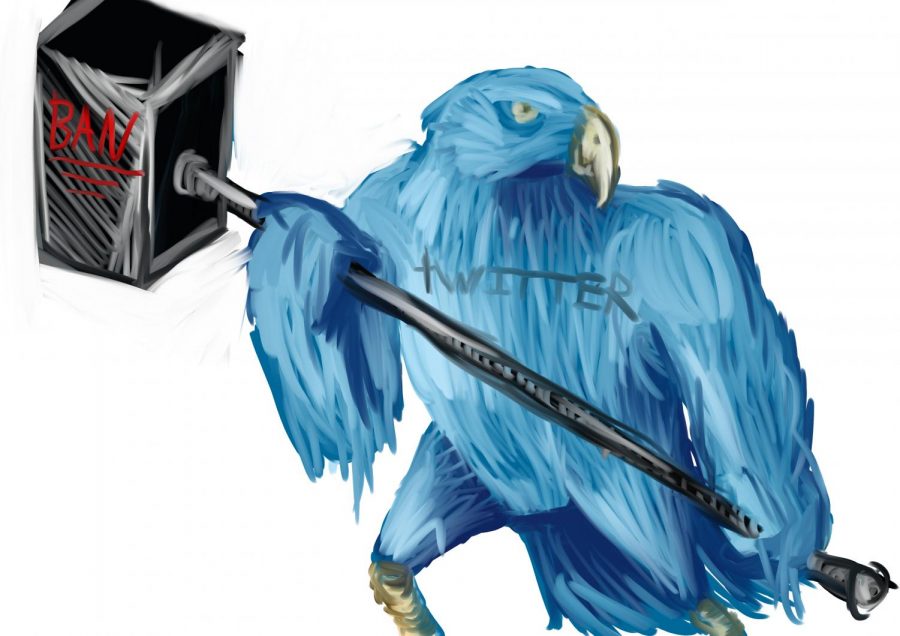Social Media Strikes Down Against Alex Jones and Prompts Discussion about Free Speech
October 22, 2018
Social media has proven over the years to be a reliable home for a variety of news organizations, some more credible than others and some outright false. One of the most infamous of these controversial social media news organizations is Infowars, run by Alex Jones. Through his platform, Jones has developed a reputation of being an over the top conspiracy theorist with almost 1 million followers on Twitter and over 2 million followers on YouTube. Students like senior Ogedei Gantumur feel that Jones “has his right to speak, but he also has a civil duty to be truthful.” Jones’s false claims have generated a lot of anger and conflict, and as can be expected, he developed an extensive history of policy violations on various platforms like YouTube, Spotify, Facebook, Apple, and Twitter. All of these platforms took action against Alex Jones and Infowars in August, and Twitter banned Jones later in September. Twitter’s ban in particular sparked a lot of questions as to whether they were right or not in banning Jones. Twitter stated that he was in violation of their abusive behavior policy for, “excessively aggressive insults that target an individual, including content that contains slurs or similar language.”
One of Jones’s worst offenses was claiming that the Sandy Hook shooting was staged by government-backed gun control activists. Despite the hurt felt by the families of the Sandy Hook shooting, Jones did not back down. According to the New York Times, Jones’ lawyer claimed, “Mr. Jones’s theories are his opinions, which is more broadly protected by the First Amendment.” Nonetheless, Twitter banned Alex Jones and Infowars from their site. This ban immediately brought up concerns about what right social media companies have to police free speech. Many students felt that Twitter was overstepping boundaries and stepping into areas that the government should control. But others like freshman Sophia Ahn believe that Twitter was right to ban Jones, “because what he said was not justified and he should be honest.”
The fact of the matter is that Twitter and other media platforms are allowed to determine who can have a voice on their platform because they are private corporations with their own rules and are independent from the government. Companies just need to make sure they are monitoring what is on their sites in an ethical way. It is important for these sites to have a set of transparent guidelines that lays out what is right and wrong, but the difficulty lies in how companies enforce these guidelines. According to the Center for Internet and Society, Facebook was criticized in the past for unfairly silencing African Americans and other minority groups but ignoring racist posts.
These companies have gained a lot of influence over the past years and, whether they like it or not, are placed with a huge responsibility to carefully monitor content on their huge platforms. It is especially relevant to political issues that generate strong opinions and gain a lot of attention and participation. Sophomore Aaron English says, “I never got into politics until social media, and realized that I listened to people.” It is especially important that the information people are reading to base their opinions on is factual to prevent further unnecessary confusion and frustration.
However, social media has also proven to be very constructive in many in other ways by connecting people and for teaching everything from complex concepts to simpler tutorials, like junior Kolton Maans mentions, “You can learn about a lot of stuff from just from YouTube.” In the end, much of the responsibility for the problems of the internet and social media lie on those who use it. Sophomore Marcus Lupse comments, “In the wrong hands, it is bad, but it is not the thing itself,” when referring to social media and its problems. As readers, it is our responsibility to think critically about what we read and realize that social media giants cannot perfectly monitor the millions of accounts on their site.
Caption: Twitter takes action against Alex Jones’ radical posts by permanently banning his personal account and Infowars account. This ban prompted discussion about Twitter’s rights to police free speech, but ultimately Twitter has the authority to decide what posts go on their own site.




